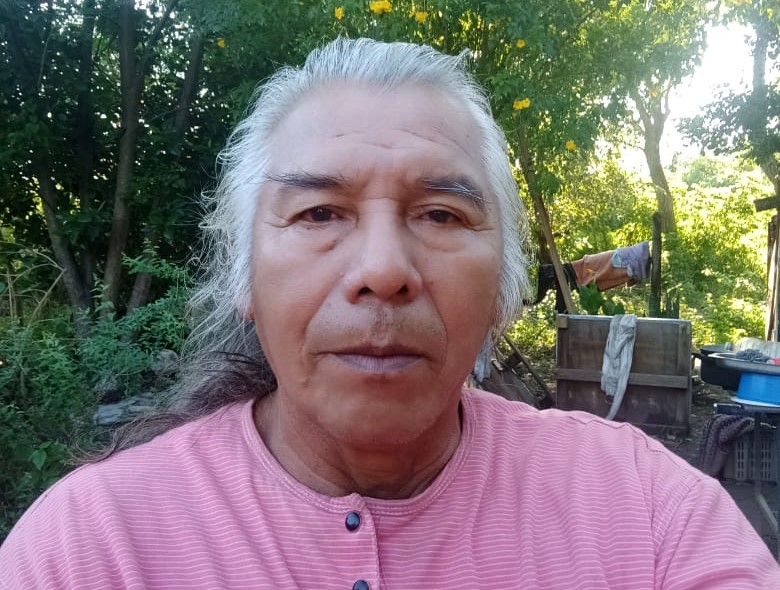Fighter for peace, defender of indigenous peoples, President of the Participatory Indigenous Consultative Council of the Republic of Argentina, lover of dialogue, declared apolitical, co-author with Araceli Maldonado of his biography “Qarashe. A fighter for his people and for the justice of his communities, a great friend, a brother, and a humanist who gives us lessons in coexistence, as we will see in this long interview that leaves no one indifferent.
We spent many hours talking, sending each other messages and photos, talking about the problems of the indigenous peoples of northern Argentina, and about the theft of their lands. He is a quiet, kind, simple man who, despite all the human rights violations he suffers, reaches out with humility.
Félix Díaz lives only for his people, for the justice denied to his people, for the young people of the indigenous communities who have no way out for a dignified future, and for the return of their stolen lands to the hands of the indigenous peoples. He speaks forcefully, firmly, with pride in his ancestors and with regret for the way they live today, marginalized, without respect, in a deep-rooted racism that denies them the benefits to which they are entitled as Argentine citizens.
It is a story of how indigenous peoples are treated in the world today, where despite international resolutions recognizing them as great defenders against the climate crisis, governments corner them, forget them, and treat them as a problem rather than a solution.
Felix shows us once again that the white man’s word is worthless. For them, their words are sacred, and yet the new government promised to continue with the Consultative Council, whose law is in force but not implemented if they would lift the camp they had set up in front of the Casa Rosada. But since there is no document or signature of the ministers in charge of their cause by the new President Milei, they have been deceived in a disgusting act that has no qualification, in which the Argentine government has no honor or word for them, despite all the laws that protect them. They have deceived them. They despise them, they ignore them.
This is the pitiful situation in which Felix and his courageous fight for the rights of his people live. A person who still believes in the will of a humane society to recognize them as citizens, and yet turns his back on those who have occupied their territories for millennia and lived in Argentina long before statehood.
Felix and his communities are survivors and deserve to be recognized as essential beings in a climate crisis whose perpetrators are turning a blind eye to the recognition of their rights as indigenous peoples.
He is a dear friend of mine and on more than one occasion I have shared my tears for his situation and that of his communities.
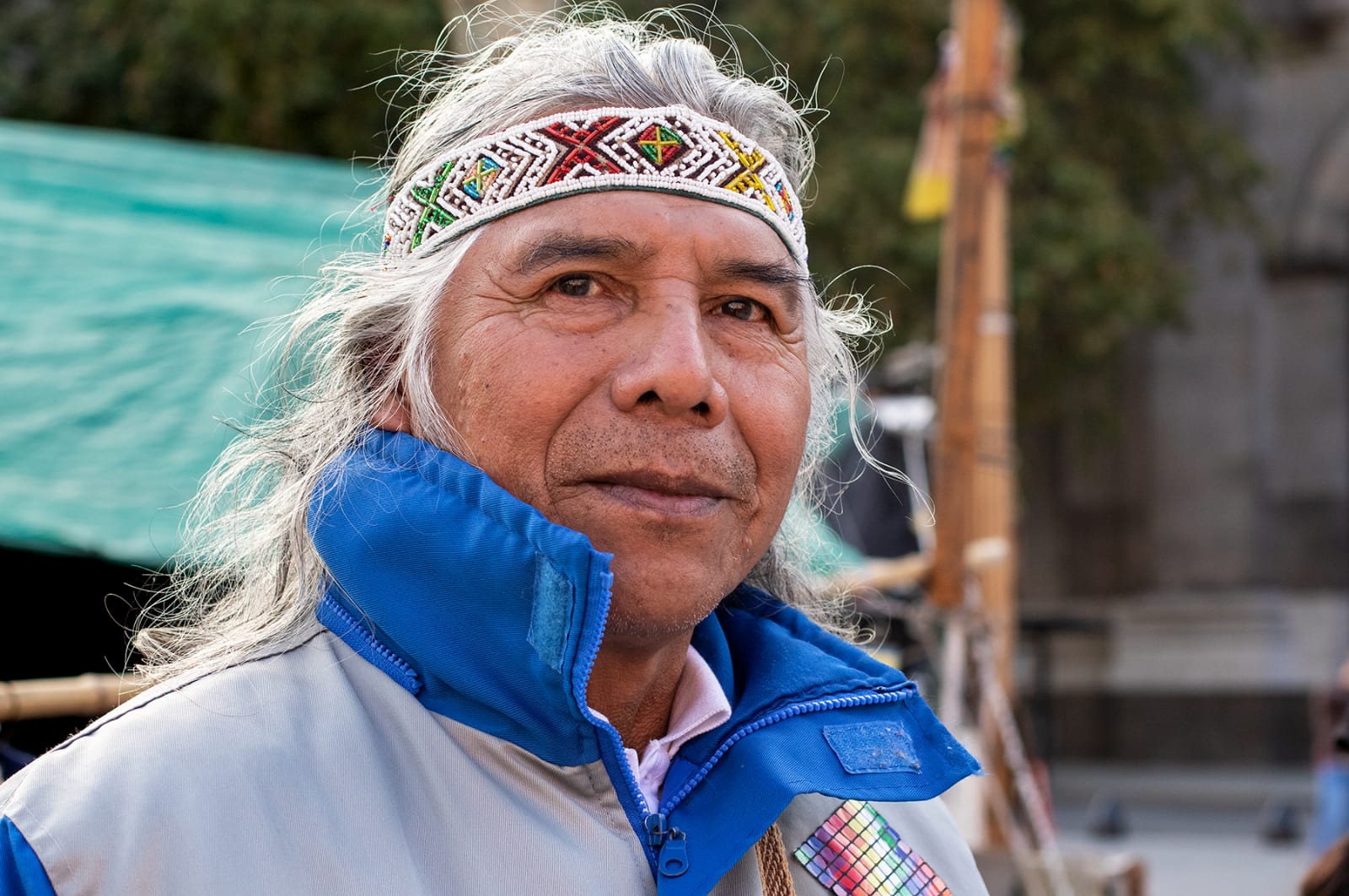 Image courtesy of Félix Díaz
Image courtesy of Félix Díaz
INTERVIEW WITH FÉLIX DÍAZ, INDIGENOUS LEADER FROM ARGENTINA
1- Félix, as an indigenous leader and member of the Qom Potae Napocna Navogoh community, you have endured many years of violations of your human rights by the Argentine government, and more specifically by the government of Formosa. How can a community endure the contempt of its own authorities?
Hello Pedro. Thank you for your constant support for the struggle of the indigenous peoples of the Republic of Argentina. We, the indigenous people of the community, have been violated by national bodies such as the National Parks Administration, which manages the protected areas and has been usurping our lands since 1979. The indigenous community was created by a national decree in 1940 through a reservation when it was national territory. Since then, we have lost access to the territory to use water, fish, gather and hunt in order to survive.
Today it is in the hands of the Pilcomayo National Park, which is protected by the Ramsar Convention on the List of Wetlands of International Importance. We no longer have access to water, ancestral medicines, fishing, hunting and gathering fruits from the forest.
2- They took away your land to declare it a National Park and they do not let you enter what has always been your place of subsistence and life. How is it possible that you cannot enter your ancestral forests? You are also denied access to water and medicines. This is a clear genocide of people who have the right to be Argentine like any other citizen. Why is this happening?
All the lakes we had in our territory have been manipulated by the municipalities in the area. They built canals to drain the lagoons and today they are dry. Inside these lagoons we had no access to water and fishing because they were stagnant waters that would collect water every year when it rained, and since then we have never had a problem with water. But they took that water away from us through artificial canals that the communities built to take it away from our territory. And from that moment on we had problems with the need for water and we started to ask the municipalities. And they bring us contaminated water and this causes many deaths due to tuberculosis, Chagas disease, pneumonia, cancer and diabetes, which is a new disease that is appearing in the Qom Potae Napocna Navogoh community.
3 – The young people in your communities do not have opportunities for decent work, and even the schools are trying to erase your culture. Is this true?
As far as the young people of the indigenous communities are concerned, they do not have the opportunity to have a decent job because most of the indigenous communities in the north have little access to education. There are very few young people who have degrees in nursing, teaching and other low-level professions. They cannot work because there are no policies that include indigenous people. We have three municipalities in our area, the municipality of Siete Palmas, the municipality of Laguna Blanca and the municipality of Laguna Naick Neck in our area. Since 1983, when democracy returned to Argentina, these three municipalities have not accepted any young indigenous people to work as street sweepers, weeders in the squares, pavement cleaners or rubbish collectors in the city. From 1983 to the present day, we have had no access to anything for our young people, and they have become victims of drug and alcohol addiction. What the government of Formosa Province is most concerned with today is sport, so that the young people can play football and volleyball every day, so that they don’t have to think and worry about the problems of lack of work, lack of improvement of the crops. So, the young people dedicate themselves to sports and drugs, and then the strengthening of evangelical Christian religions is included. In all the communities, the churches are growing rapidly, and the government is responsible for moving the members of a church to another place free of charge so that they do not have to think about the issue of territory and natural resources. In this way, they keep them active without being able to think about the obstacles that arise in the indigenous communities.
5.- Until a few days ago, you had been camped in front of the Casa Rosada for more than two years, asking to be received by the President to explain your problems. Now you have left the camp because of a promise. What was promised to you?
We started to make these demands with indigenous participation in front of the national government in 2015, camping for a year in the federal capital and asking for an audience with the then president, Cristina Fernandez, who never listened to us or heard us. Then came the next president, Mauricio Macri. The new government tried to do something, through the pressure we kept up and the visit of former US President Barack Obama, who visited the Escuela de Mecánica Armada of Argentina, where institutions such as the National Institute of Indigenous Affairs, the Ministry of Justice and Human Rights operate. While we were camping inside the Ministry of Human Rights, Barak Obama’s visit allowed the national government to listen to and accept our proposal to be part of public policy and gave us Decree 672/16 with the creation of the Participatory Consultative Council of Indigenous Peoples of the Republic of Argentina (CPPIRA) as an indigenous space, of which an assembly was held and the indigenous people elected me as president of the CPPIRA from 2016 to 2021.
Mauricio Macri’s mandate ended and we took up the demand again with President Alberto Fernández, who forced us to camp in front of the Casa Rosada from 2021 to 2023, demanding an audience and the continuity of the physical space we had, an office. Alberto Fernández never listened to us, he never listened to us, but the decree is still in force today. We have created this as a space for indigenous peoples, through the figure of the Universal Declaration of Human Rights, in which international governments have created so that indigenous peoples are consulted and participate in public policies and any decision that is taken, governments must consult indigenous peoples to see if they agree with a project or not, they must have prior information, informed with documents for those projects that are carried out in indigenous territory. This has never happened, and what we wanted was to work with public policy. And we spent three years camping in front of the Casa Rosada in the Plaza de Mayo.
Now we have an agreement with the current government that we will stand up, but on the condition that they allow us to return to work with the national government as indigenous people and not as political allies, which is sometimes used as a condition for the indigenous issue to be sponsored by political parties, and we don’t want that because we are independent.
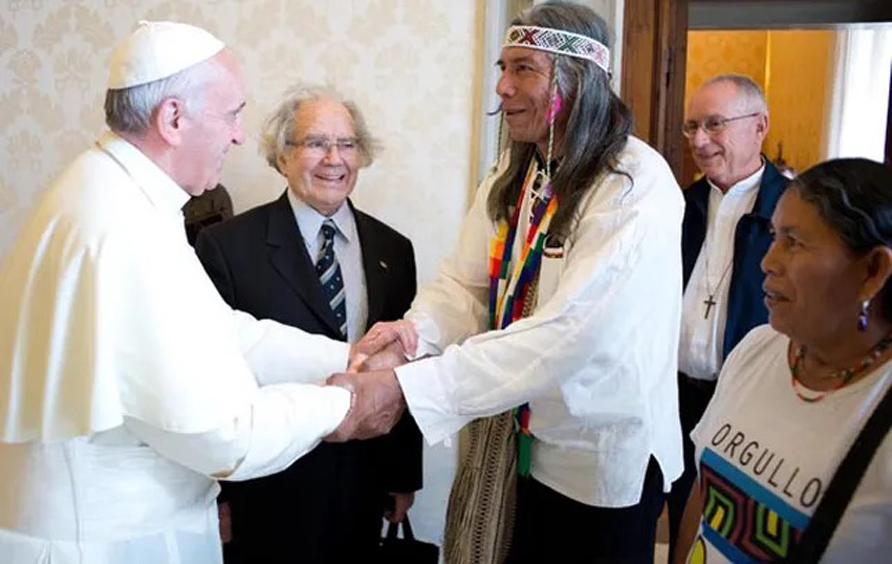 Photo of Félix Díaz during his visit to the Pope to demand the rights of the indigenous peoples of Argentina.
Photo of Félix Díaz during his visit to the Pope to demand the rights of the indigenous peoples of Argentina.
6- The Indigenous Consultative Council, of which you are president, does not have a seat, nor are you currently able to carry out your work. The Argentinean government, although its laws protect you, does not respect them. Is there no effective judicial system to support your rights?
Here in Argentina, the ethnic and cultural pre-existence of indigenous peoples is recognized, as is intercultural bilingual education. We have our laws, such as Law 23.302, which is a national law, and ILO Convention 169, which is accepted and has also been created by law in Argentina, voted by the Senate of the Nation and the Chamber of Deputies, which became Law 24.071. And we have another law, Law 26.160, which talks about the regularization of the lands occupied by indigenous communities in any part of the country. We also have our laws in each province. In Formosa we have the Integral Law of the Aborigines, which was created in 1984 and talks about the issue of cultural values, and the identity of each tribe so that we are respected.
However, none of these laws have been put into practice for the care and protection of indigenous peoples. The justice system does not know indigenous legislation because it has never been part of the education of Argentinean citizens about the existence of indigenous rights at the national level.
When a complaint is made, the police always use the figure that it has nothing to do with justice, but a simple statement saying that the indigenous person has already made a complaint and that they will investigate. The prosecutors who work in each region are appointed by the political power of the day, as in the case of the governor of the province, Dr Gildo Insfran, who is the one who determines the function of a judge and the prosecutors of the province. All the complaints we have been making for a long time have never been investigated. But when an indigenous person is denounced by a criollo or by the indigenous person himself, the justice system acts immediately. In January or February of this year, when an indigenous family was accused of stealing cattle, the magistrate of the town of Clorinda sent out an order before noon to search the family’s three precarious homes in the area. They didn’t have time to think about what had happened, no one knew about the complaint.
In 2007, a child was run over by the mayor of the area, and it was deliberate, because the girl, who was coming from school and walking on the tarmac road, ran straight at her and killed her, and they put the figure of culpable homicide, so that it was an accident. The lawyers who handled the case stole the compensation due to the family from the insurance of the vehicle that ran over her. We filed a complaint against the lawyers and they used the number of insolvencies to get rid of all the assets that each of them had. This is one of the small examples I can give you.
The Consejo Consultivo Participativo de los Pueblos Indígenas de la República de Argentina, it recognizes that the indigenous peoples have their organization, that the national government accepts the proposal that we be consulted and participate in public policies with the national government, to collaborate and help the indigenous populations of those who have a territorial conflict, in the area of health, of structure, as in the case of building a school, a health center. This decree helped us to realize that within the state system, the presence of indigenous people in public institutions is not accepted. We were never listened to.
With the change in the current government, we asked the Minister of Security and the Minister of Human Resources, who are responsible for channeling this demand that we have with the national government, to maintain Decree 672/16, to demonstrate the political gesture that they have with the indigenous peoples. In return, they asked us to remove the camp in front of the Casa Rosada as a political agreement, so that they could reinstate us and give us an office so that we could work alongside the state as indigenous people and not as political allies conditioned by the state itself. They accepted our proposal, but we had no written document to show that the ministers had signed this agreement. We have no proof to present to the national government because we were raised orally, and this is another weakness that we indigenous people have, to trust and believe the word of the white man. This is the reality.
7- As you know, I started a project for two schools in the Wichi community. What did the brothers think?
With regard to the request, we made to you as the Consultative Council through the phi Foundation and the sale of your books, we asked for solidarity through you, Pedro, to help us at least complete the walls of two small schools in the western zone of the province of Formosa, on the border with the province of Salta, so that the Wichi children can have walls to protect them from the cold that is coming. The first school building is now under construction and the parents and children are very happy and grateful for the support they are receiving from your foundations. They are especially grateful to Pedro, who has done a tremendous amount of work to help the children and give them a place to shelter from the cold, rain and wind that is coming.
So, we are very grateful and we are able to fulfil this dream of the parents and the children, so that they can study in precarious little schools, but that they can be sheltered from the inclement weather. This is something that is really important and appreciated by the Wichi people of the area.
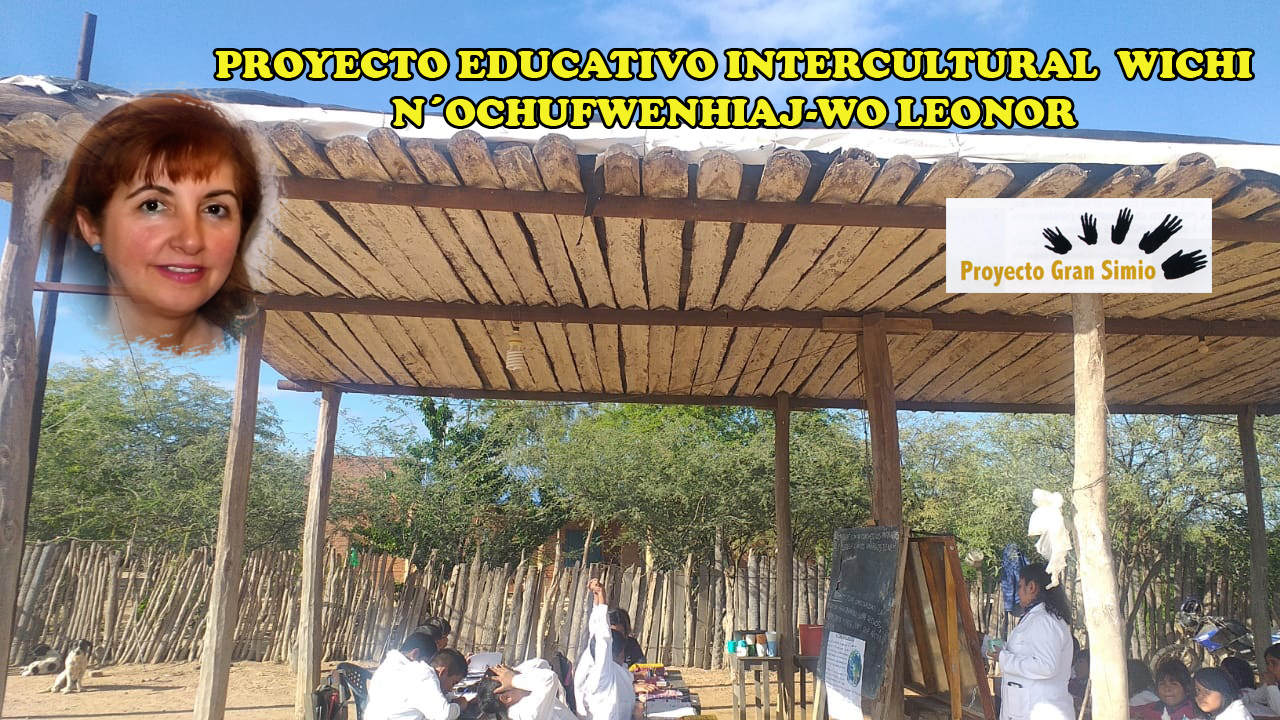 Photo of the Wichi community in Argentina, where two schools are to be built at different locations in the northern province of Formosa. The picture shows the young indigenous people studying under a simple wooden roof, open to the elements.
Photo of the Wichi community in Argentina, where two schools are to be built at different locations in the northern province of Formosa. The picture shows the young indigenous people studying under a simple wooden roof, open to the elements.
8.- I think that this aid is very small compared to all the difficulties you have, such as the lack of water, medicines, and surely many other schools are also in terrible conditions. How can all this be solved?
The truth is that this small contribution from you is a very small part, but at least you can cover the needs of the two communities and the lack of water that is everywhere. Because, as I told you about the case of our community in Qom, they have emptied our lakes, they have dried up because of the contamination of the fields with soya, which has used glyphosate to contaminate the place, the water, the forest, and this also makes it very difficult to harvest fruit and fish, which can now be used because the lakes are contaminated. From there, the indigenous peoples have to make requests to the municipalities to bring water to the communities, and often these municipalities find that the trucks are broken, and the tires are flat because of the bad state of the roads and also because of the lack of fuel. These are the arguments used by the mayors of the municipalities.
9.- Do you think that with the new government, you have hope that your voice will be heard?
The truth is that the governments always listen to the voices of the indigenous peoples, but they never respond to the requests we make to the national authorities.
We know that the problems we face are many, and that is why the governments, both national, provincial, and municipal, do not have the political will to address and solve the problems of the indigenous peoples, and this has always been the case and will always be the case because the indigenous issue is not a state issue. They always see us as poor indigenous people who need to be fed, who need to be taught, who need to be told how to speak, and who don’t need to be looked after. If they protest, they are rebels, they are the bad guys in the film. This is the argument that governments use when we start to protest so that they give us the human rights that we deserve so that we can live well with our families, in our territories, and with our community.
10.- After the school project, I would like to do others according to your needs. Could you give a message to those who want to participate in the projects?
Yes, Pedro, the truth is that the support you give to two communities is very important to us, but there are many more, especially for the Wichi people. Because there are other people, called Nivacle, who have chosen voluntary isolation. At that time there was no private property, no cattle, no forestry, no agriculture, and they were able to move around the territories without any fences, and after that, in the year 2000 or so, they could no longer move around the places because they were in the hands of ranchers, farmers, and they had to stay in the places where they were allowed by an agreement with the owner of the land, in exchange for staying in the place where they were. Today they participate in education through their children, who have identity cards, but their parents do not have access to benefits and citizenship because the government says they are foreigners and the elderly are not given identity cards. This is the big problem of the elders of the Nivacle people, who live on the border between Paraguay and Argentina.
But there are other people like the Peligás, the Qom people, who are going through the same thing. The needs of the indigenous peoples are enormous and that is why we are turning to you as an organization to help us find or manage resources so that the indigenous schools can have a place where the children can be educated and learn to read and write, so that in the future they can defend their human rights and demand that governments respect them through the education they receive in public education.
11- We have known each other for a long time and I think of you as my brother. What do you think of our friendship?
Yes, the truth is that it has been a privilege for me to have known each other and I am grateful to Brother Osvaldo Caballero of the Peligás of the La Esperanza community. He was the one who put me in touch with you and from there we began to talk, we began to trust each other and we were able to share the sufferings, and the pains that we all went through.
For me, this brotherhood and our friendship are very important to rebuild the humanity we once had with the first inhabitants of the different continents. There was this respect after colonization, but today that respect is gone. They no longer see us as a special or unique people. When they see that we are indigenous, it seems that we are like a disease for society and they discriminate against us, they expel us from our lands. That is why this relationship of friendship, of brotherhood with you is important. It is very important as indigenous people because we need this acceptance so that we can live together in peace and build a healthier world where we can respect nature, and the different cultures of different countries and where it gives us the possibility of having a healthier, more humane world and where we can live together in peace and harmony with other beings who are not indigenous but who are also human and we ask you to help us so that we can continue to promote the search for peace on a global level.
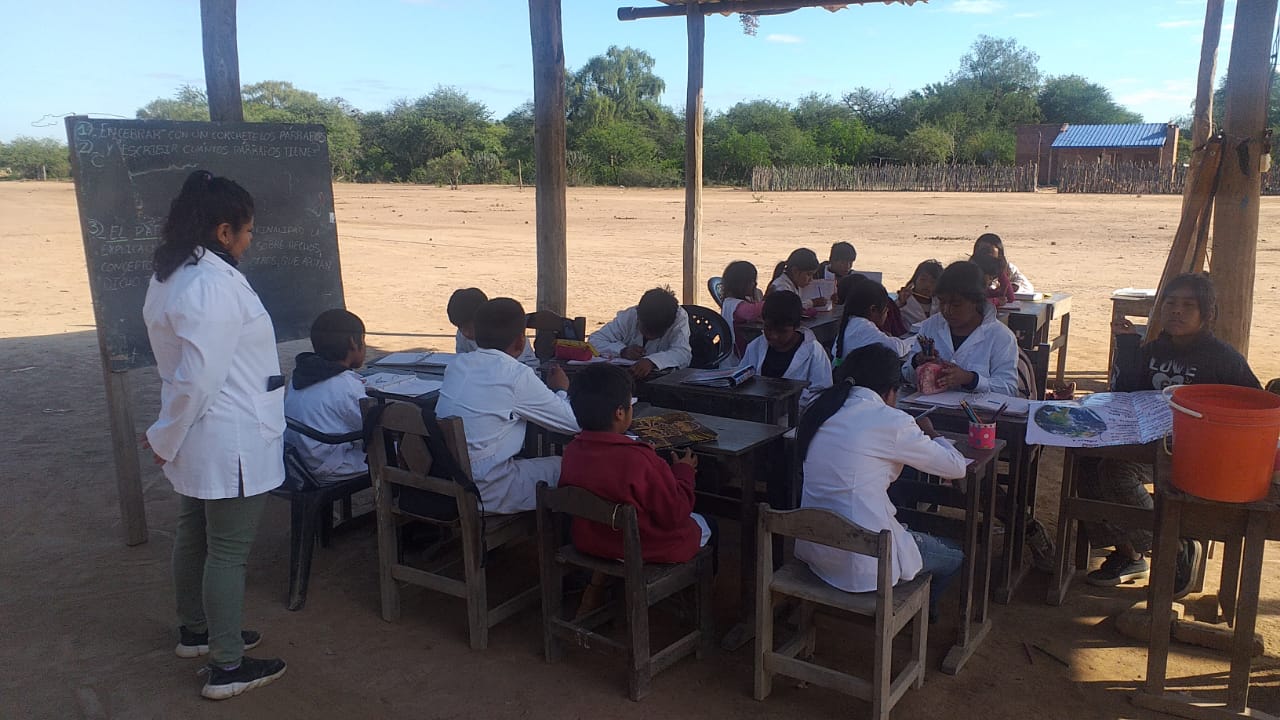 Image of the Wichi people. One of their schools, where they are going to build a real school where the children can study in peace. There are already contributions from the Phi Foundation and the sale of books by the author of this interview.
Image of the Wichi people. One of their schools, where they are going to build a real school where the children can study in peace. There are already contributions from the Phi Foundation and the sale of books by the author of this interview.
12.- The Phi Foundation has provided 4,000 euros for the schools, together with my contribution from the sale of the books and the Great Ape Project, we will always be with you. Could you send a message to the members of the Phi Foundation and the Great Ape Project?
We are very grateful to Pedro for the Phi Foundation’s contribution of 4,000 euros and also for your contribution through your books. The children are really happy to know that there are people who care about the situation of the Wichi children in this region, and for us it has been a miracle to get to know each other and share important moments through this means of communication, making our reality known.
The indigenous peoples are the first inhabitants of this continent, but we are the most isolated, the most mistreated, discriminated against by the state and also by public institutions in terms of education and health, and also despised by the municipalities, the police, the gendarmerie, and other state institutions. Indigenous people are always a problem for the state and society. And that is what concerns us. That is why we want to focus on education to change this history and give us our rightful place as any human being who can contribute to the growth and development of a country through the products that indigenous people make so that we can offer something to society with our handicrafts of different kinds, These are very special products made of palo santo, algarrobo and other materials that they use to make bags, fabrics and also some metals, wickerwork, purses that the indigenous people make themselves using the raw materials of the natural resources that exist in the region.
For all these reasons, it is important that the Foundation and the Association that you have can one day go to Argentina and visit these places and experience the reality and strengthen the expectation of contributing to the good of humanity. We hope that you will be able to visit us and meet us in person, so that we can embrace each other fraternally and share the joy that we deserve for our efforts to give visibility to the problems suffered by the indigenous peoples of Argentina.
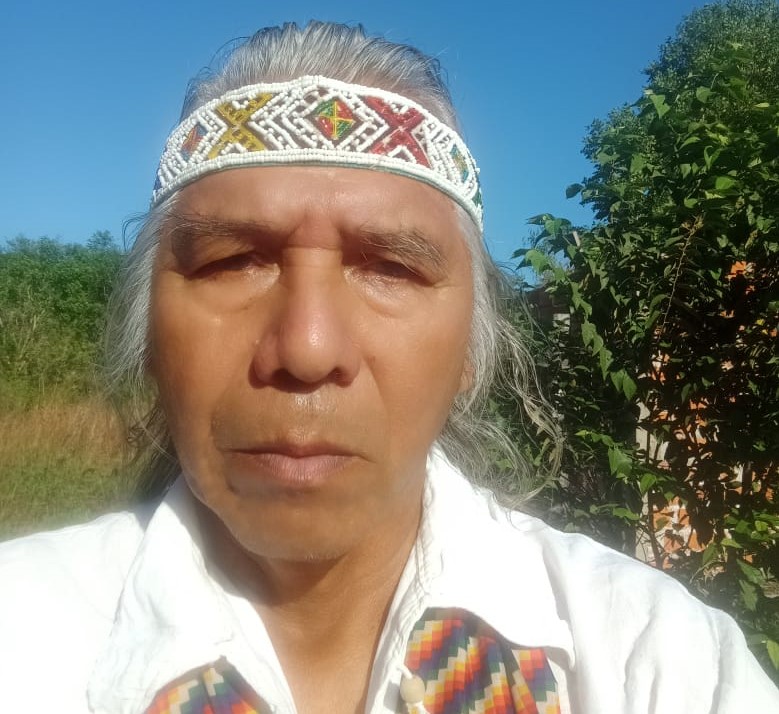 Image of Félix Díaz in one of the many actions he carries out in defense of the indigenous communities.
Image of Félix Díaz in one of the many actions he carries out in defense of the indigenous communities.
13- I would like to leave this last question to whatever you have to say or denounce.
Well, Pedro, we are denouncing before the Supreme Court of Justice of the Nation the expropriations that the States have made of our territories, leaving us without any means of subsistence. Our lands are everything to us. For indigenous peoples, their territory is like a supermarket. There is medicine, spirituality, food, raw materials for handicrafts and also the animals that live there, the non-human beings that have supernatural powers and that have had contact with our ancestors. And we don’t have them anymore because we have no territory.
Many of the indigenous people have been displaced from their places because they don’t have water. It is not that they are evicted with guns or threats, but that we are denied water, access to health, education, housing, and we are also denied work. So many members of the communities leave their places to survive in the big cities. But in the big cities, there is the problem of drugs, and young people start to commit crimes, they learn to steal, kill, and take drugs, and they lose the opportunity to regain the respect that their ancestors had for the lives of others.
For this reason, we are seeking to strengthen our struggle through the resources you can give us. We hope that you will help us to reach the UN, so that we can talk to the authorities of this international organization through our presence and our direct participation because we are tired of the fact that the institutions that sponsor the needs of the indigenous peoples get the resources, and they never reach the indigenous peoples. They always remain in the foundations, in the religions, in the associations, in the peasant organizations.
The indigenous figure is a figure that has always managed to obtain the demands made on society, solidarity. Resources are obtained, but the problem is that the institutions that manage them do not pass them on to the indigenous communities. That is why we continue to be victims of the manipulation of society, which manages corruption and the lives of the poverty of the people who live by asking for water and resources. But when the resources arrive, they forget about the beneficiaries of the benefits that the international financial agencies give to the foundations to solve these problems, such as schools, water, health, and productive projects.
What we want is to be direct actors in indigenous politics, but to articulate with people who have an interest in being able to protect human beings with all the rights to which they are entitled.
So, I am very grateful to Pedro for the opportunity to be in contact with you. I hope that the complaints and the demands that we are making can be channeled through the appropriate channels and that good-hearted citizens will help us and contact us. We need the technical, scientific, and intellectual part to be able to do the project well and to be able to present it to the international financial agencies so that they can finance our project through the technicians who can give us a hand, with advice, and put together a project of great importance.
Thank you, Pedro, and we are all very grateful for your support. Elma Toledo, from the Wichi community, is a great woman who gives her energy, and her time and defends the education of the children in her community. She has left her home, she accompanies the indigenous struggle as a woman. She has been away from her home for more than seven years and today she has returned with a beautiful gift (the money contributed for the construction of the first school) for her children who are going to have a small school and it was worth her sacrifice and effort to be able to accompany this struggle of the indigenous people of the Republic of Argentina. Thank you very much.


